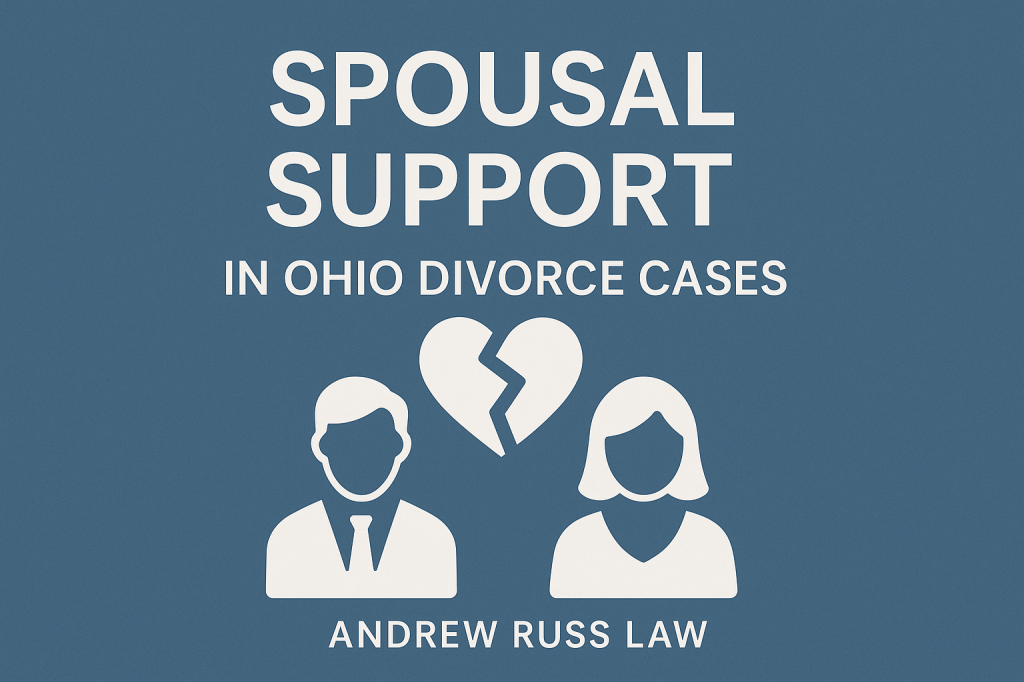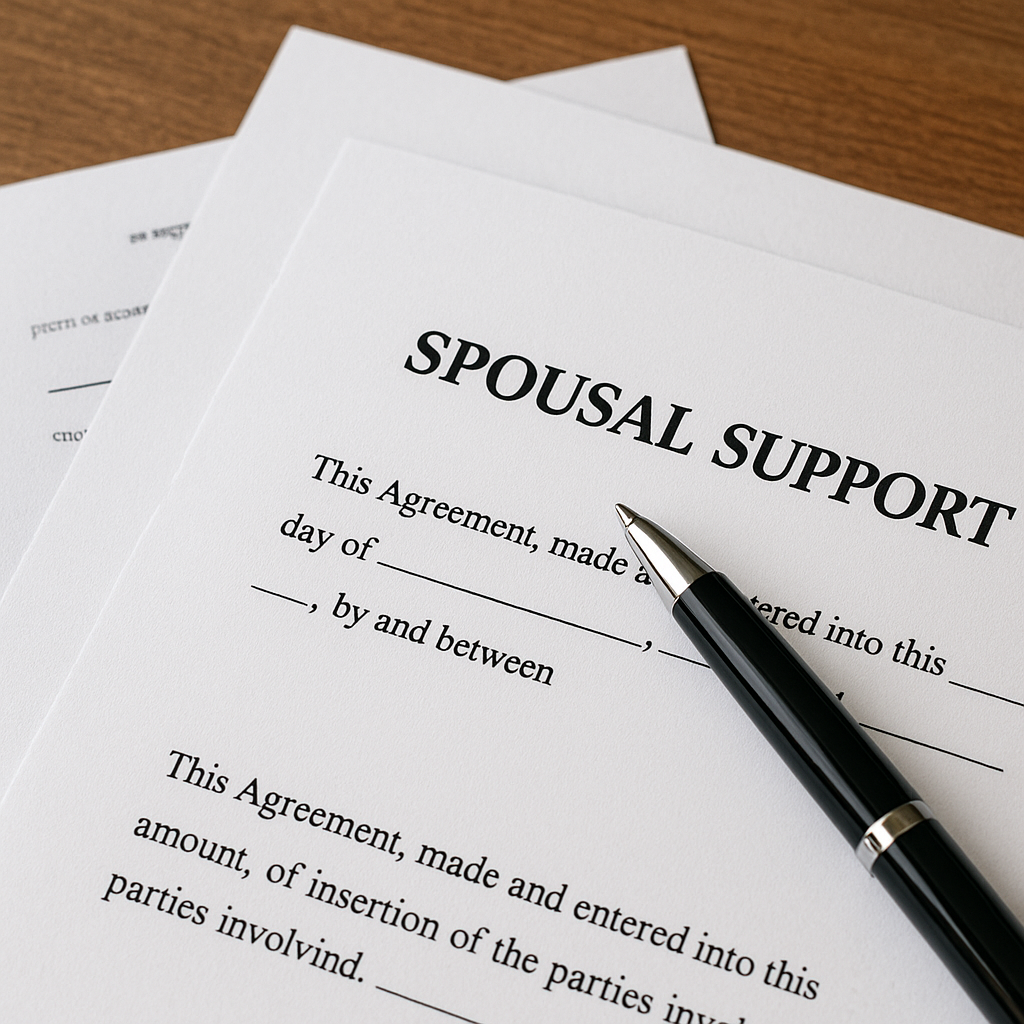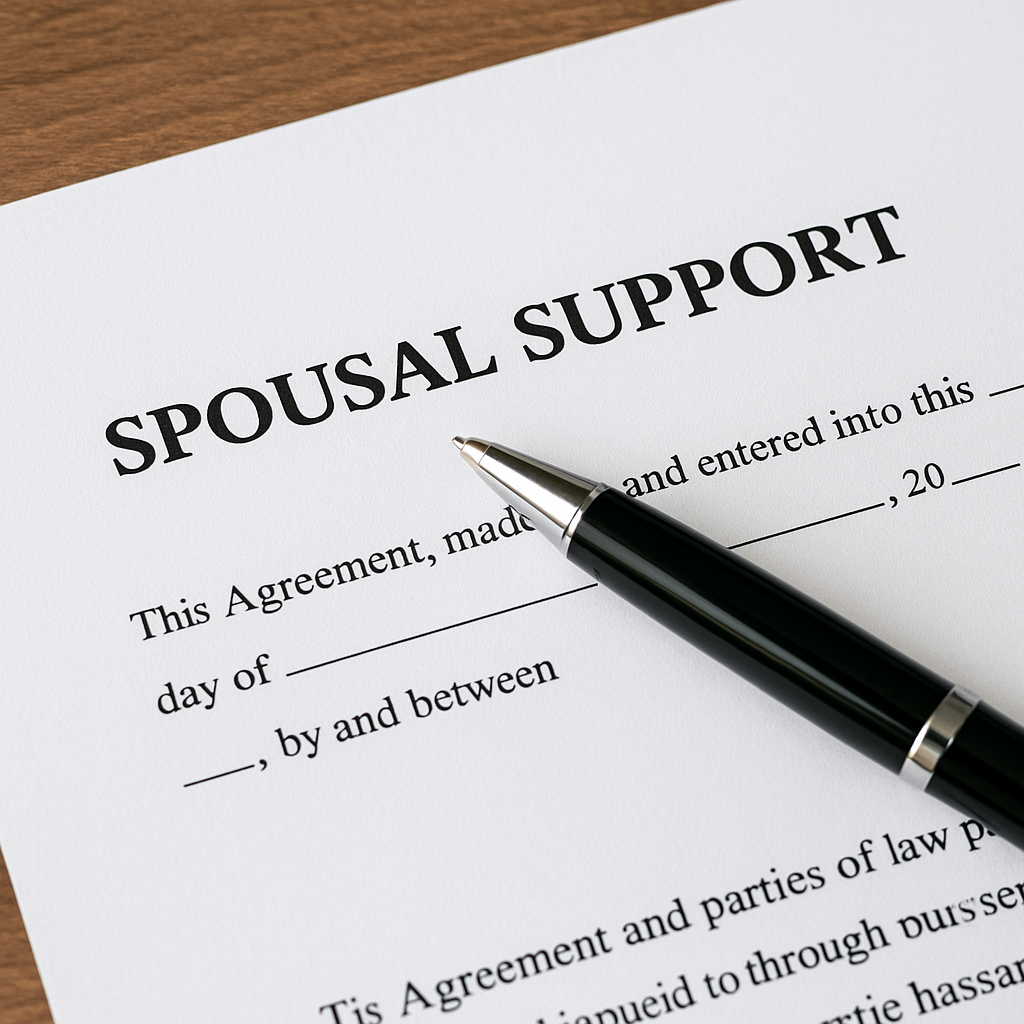Spousal Support in Ohio Divorce Cases: A Guide
- Aug 3, 2025
- 5 min read
By Attorney Andrew Russ, Ohio Divorce Lawyer
Spousal Support in Ohio Divorce Cases | Andrew Russ Law
Learn how spousal support (alimony) works in Ohio divorce cases. Understand factors courts consider, how support is calculated, and how it can be modified. From Andrew Russ Law.

Introduction
When a marriage ends, financial stability becomes a key concern for both spouses. In Ohio, spousal support—often called alimony—is designed to address the financial imbalance that may result from divorce. Unlike child support, which is guided by a statutory formula, spousal support in Ohio is discretionary and determined by a judge after considering several statutory factors.
Whether you’re the spouse seeking support or the one who may be ordered to pay, understanding Ohio’s spousal support laws is essential. This guide from Andrew Russ Law breaks down how spousal support works in Ohio divorce cases, including eligibility, factors courts consider, duration, tax implications, and how orders can be modified.
1. What is Spousal Support in Ohio?
In Ohio, spousal support refers to court-ordered payments from one spouse to another after a divorce or legal separation. The purpose is to help the recipient maintain a standard of living reasonably comparable to what existed during the marriage.
Unlike some states that use rigid formulas, Ohio law (Ohio Revised Code § 3105.18) allows judges broad discretion in determining whether support is appropriate, and if so, how much and for how long.
Key Points:
Spousal support may be temporary (during divorce proceedings) or permanent (post-divorce).
It can be paid in a lump sum or as periodic payments (monthly or quarterly).
It is separate from property division in an Ohio divorce.
2. When is Spousal Support Awarded?
Ohio courts do not automatically award spousal support. Instead, the requesting spouse must show that they have a need for financial assistance and that the other spouse has the ability to pay.
Spousal support is more likely in cases where:
There’s a significant income disparity between spouses.
One spouse left the workforce to raise children.
One spouse supported the other’s education or career advancement.
The marriage lasted many years, and one spouse is near or past retirement age.
3. Temporary Spousal Support in Ohio
During divorce proceedings, a court may award temporary spousal support to help maintain the status quo until the divorce is finalized. This support is based on immediate financial needs and may be calculated differently than post-divorce support.
Example: If one spouse has been a stay-at-home parent for 15 years, the court may award temporary support to help them pay bills while the case is pending.

4. Factors Ohio Courts Consider for Spousal Support
Under ORC § 3105.18(C)(1), courts must consider 14 statutory factors when deciding whether to award spousal support and in what amount. These include:
Income of each spouse (from all sources).
Relative earning abilities of the spouses.
Ages and physical, mental, and emotional conditions of the parties.
Retirement benefits available to each spouse.
Duration of the marriage.
Extent to which one spouse’s earning ability was reduced during the marriage due to childcare or household duties.
Standard of living established during the marriage.
Education, training, and employment experience of each spouse.
Time and expense necessary for the dependent spouse to become self-sufficient.
Tax consequences for each spouse.
Lost income production capacity due to marital responsibilities.
Contributions to the education or earning capacity of the other spouse.
Assets and liabilities of each party.
Any other relevant factor.
Because the law allows consideration of “any other relevant factor,” judges have significant flexibility in determining awards.
5. Duration of Spousal Support in Ohio
Ohio law does not mandate a fixed formula for the duration of spousal support. Instead, courts decide based on:
Length of the marriage – Longer marriages often result in longer support periods.
Ability to become self-sufficient – Courts may award short-term (rehabilitative) support if the recipient can re-enter the workforce after training or education.
Age and health – Older spouses or those with health issues may receive longer support.
Typical Scenarios:
Short-term marriages (under 5 years): Spousal support is rare and, if awarded, is usually brief.
Medium-term marriages (5–20 years): Support may be awarded for a set period to allow the recipient to become self-sufficient.
Long-term marriages (20+ years): Courts may award support of longer or even indefinite duration.

6. How Spousal Support is Calculated in Ohio
Unlike child support, there’s no set formula for calculating spousal support in Ohio. However, attorneys and courts often use informal guidelines based on income differences and living expenses.
Courts analyze:
Gross income of each spouse.
Necessary expenses (housing, utilities, insurance, transportation, etc.).
Lifestyle during the marriage.
Ability to maintain that lifestyle post-divorce.
Attorney Andrew Russ at Andrew Russ Law often works with financial experts to present clear, compelling financial evidence to the court.
7. Tax Implications of Spousal Support
Since the 2019 federal tax law changes, spousal support payments are:
Not tax-deductible for the paying spouse.
Not taxable income for the receiving spouse.
However, older divorce decrees (before 2019) may still follow the old rules unless modified. Ohio does not have separate tax treatment for spousal support beyond federal guidelines.
8. Modifying Spousal Support in Ohio
Spousal support orders can only be modified if the divorce decree explicitly allows for it and there’s a substantial change in circumstances.
Examples include:
Significant income loss or gain by either spouse.
Serious illness or disability.
Retirement.
Remarriage or cohabitation by the recipient spouse (often grounds for termination).
Because modification depends on the original decree’s wording, having an experienced Ohio divorce attorney draft the terms is crucial.
9. Termination of Spousal Support
Spousal support in Ohio generally ends when:
The term set by the court expires.
Either spouse dies.
The recipient spouse remarries or enters into a supportive cohabiting relationship.
Courts may also terminate support if the paying spouse can prove that the recipient no longer needs financial assistance.
10. Enforcing Spousal Support Orders in Ohio
If a paying spouse fails to comply, Ohio courts can enforce spousal support orders through:
Wage garnishment.
Contempt of court (including fines or jail time).
Property liens.
Working with a knowledgeable Ohio family law attorney ensures enforcement actions are taken promptly.
11. How Spousal Support Interacts with Property Division
While spousal support and property division are separate legal matters, they influence each other. For example:
A spouse receiving a large share of marital assets may get reduced spousal support.
If assets are illiquid (e.g., real estate), the court may award more spousal support instead of forcing a sale.

12. Common Myths About Spousal Support in Ohio
Myth 1: Spousal support is automatic.Reality: It’s awarded only if the court finds it appropriate based on statutory factors.
Myth 2: Only women receive spousal support.Reality: Either spouse can receive support, and many cases involve men as recipients.
Myth 3: Spousal support lasts forever.Reality: Most awards are temporary and meant to allow the recipient time to become self-supporting.
13. Why You Need an Experienced Ohio Divorce Attorney
Spousal support cases are complex because they rely heavily on judicial discretion and financial evidence. An experienced Ohio divorce lawyer can:
Present strong arguments supported by financial documentation.
Negotiate settlements to avoid prolonged litigation.
Ensure the decree includes favorable modification terms.
At Andrew Russ Law, we represent clients across Ohio in spousal support disputes, ensuring fair outcomes that protect long-term financial stability.
14. Links for Andrew Russ Law Blog
For more on Ohio divorce issues, see:

Conclusion
Spousal support in Ohio is not one-size-fits-all—it’s a tailored decision based on numerous factors, from income disparities to the length of the marriage. Whether you’re seeking support or contesting it, the key to achieving a fair outcome lies in thorough preparation and skilled legal advocacy.
Andrew Russ Law is committed to guiding Ohio clients through every stage of the divorce process, ensuring your financial interests are protected now and in the future.
LINKS:



